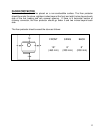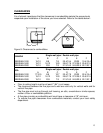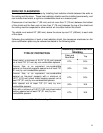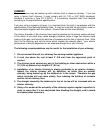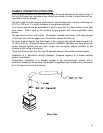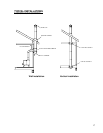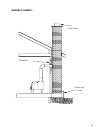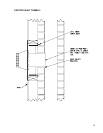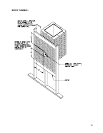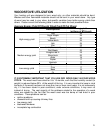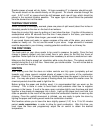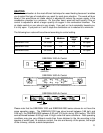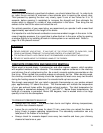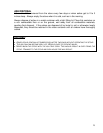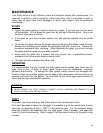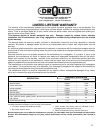
26
MAINTENANCE
Your Drolet stove is a high efficiency stove and therefore require little maintenance. It is
important to perform a visual inspection of the stove every time it is emptied, in order to
insure that no parts have been damaged, in which case repairs must be performed
immediately.
GLASS
• Inspect the glass regularly in order to detect any cracks. If you spot one, turn the stove
off immediately. Do not abuse the glass door by striking or slamming shut. Do not use
the stove if the glass is broken.
• If the glass on your stove breaks, replace only with glazing supplied from the Drolet
dealer.
• To replace the glass, remove the screws retaining the glass mouldings inside the door.
Remove the mouldings and replace the damaged piece with a new one. Perform the
procedure backwards after replacing. When replacing the glass, you should change
the glass gasket to make sure you keep it sealed.
• Never wash the glass with a product that may scratch. Use a specialized product,
available in the stores where wood stoves are sold.
• The glass should be washed only when cold.
GASKETING
It is recommended that you change the door gasket (which makes your stove door air
tight) once a year, in order to insure good control over the combustion, maximum
efficiency and security. To change the door gasket, simply remove the damaged one.
Carefully clean the available gasket groove, apply a high temperature silicone sold for this
purpose, and install the new gasket. You may light up your stove again approximately 24
hours after having completed this operation.
WARNING:
• NEVER OPERATE THE STOVE WITHOUT A GASKET OR WITH A BROKEN ONE. DAMAGE TO THE
STOVE OR EVEN HOUSE FIRE MAY RESULT
PAINT
Only clean your stove with a dry soft clothe that will not harm the paint finish.
If the paint becomes scratched or damaged, it is possible to give your wood stove a brand
new look, by repainting it with a 1200
o
F heat resistant paint. For this purpose, simply
scrub the surface to be repainted with fine sand paper, clean it properly, and apply thin
coats (2) of paint successively. Refer to page 18 of the present manual for the paint curing
process.



